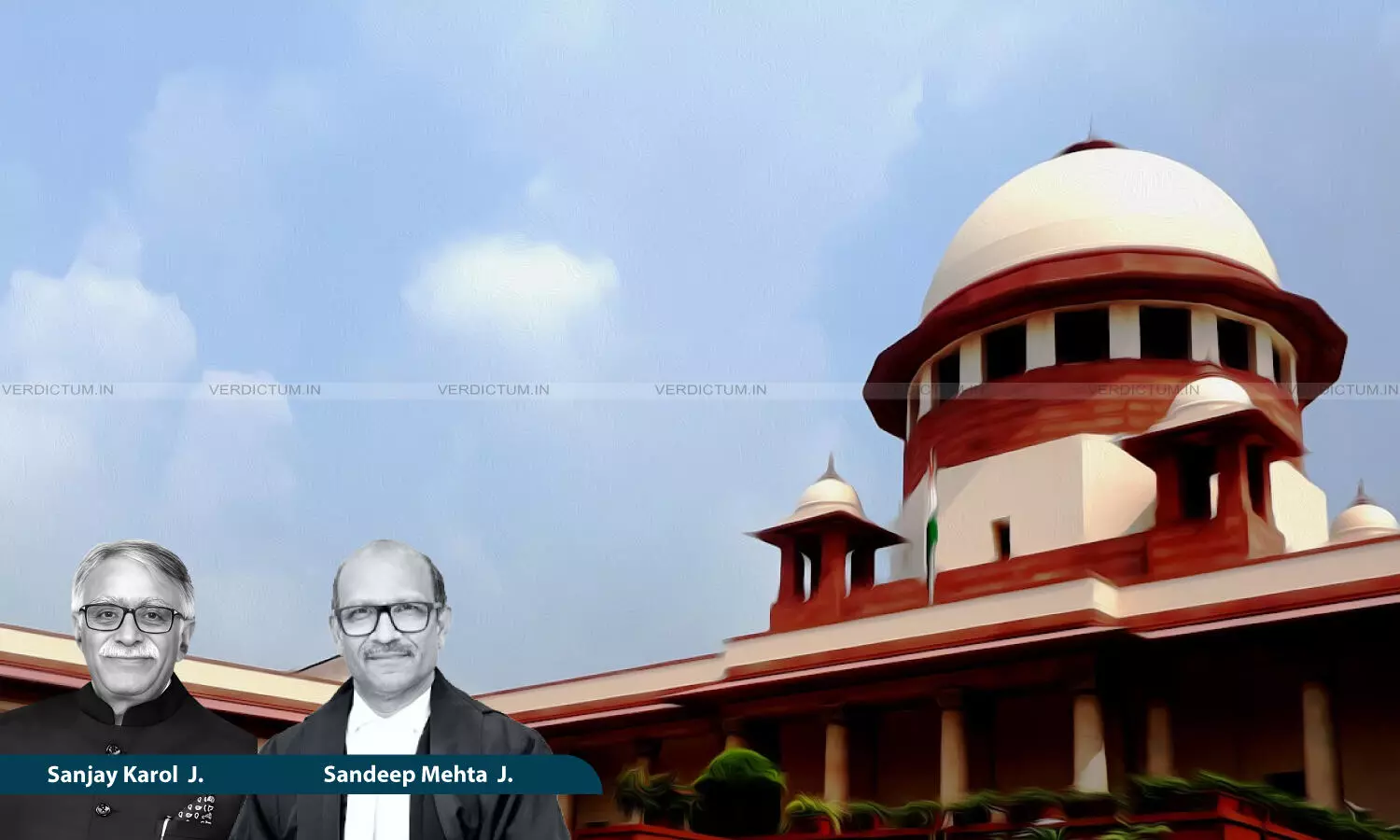
Justice Sanjay Karol, Justice Sandeep Mehta, Supreme Court
“Child Abuse” Offence U/S.8 Goa Children's Act Not Attracted To Every Trivial Or Isolated Incident Involving A Child: Supreme Court
 |
|The appeal before the Supreme Court was filed by the accused appellant, who was convicted by the Children’s Court of the State of Goa.
While acquitting a man convicted for the commission of an offence under Section 8 (2) of the Goa Children’s Act, 2003, the Supreme Court has held that the offence of “child abuse” as provided under section 8 cannot be attracted to every trivial or isolated incident involving a child.
It must necessarily co-relate with acts involving cruelty, exploitation, deliberate ill-treatment, or conduct intended to cause harm, the Court added.
The appeal before the Supreme Court was filed by the accused appellant, who was convicted by the Children’s Court of the State of Goa.
The Division Bench of Justice Sanjay Karol and Justice Sandeep Mehta asserted, “The offence of child abuse necessarily presupposes an intention to cause harm, cruelty, exploitation, or ill-treatment directed towards a child in a manner that exceeds a mere incidental or momentary act during a quarrel. A simple blow with a school bag, without any evidence of deliberate or sustained maltreatment, does not satisfy the essential ingredients of child abuse. To invoke the penal consequences of such a serious offence in the absence of clear intention or conduct indicative of abuse would amount to an unwarranted expansion of the provision.”
Arguments
It was the case of the appellants that ex facie, the offence under Section 8 (2) of the Goa Children’s Act, 2003 was not made out against him as he was alleged to have casually hit the injured child by a school bag belonging to appellant’s own son. This, according to the appellant, was unintentional and not covered within the definition of child abuse as defined under Section 2(m).
It was the case of the Respondent State that the offence under the Act is one involving moral turpitude, and the legislation itself has been enacted to curb rampant cases of child abuse in the State of Goa.
Reasoning
The Bench found that the incident occurred on February 1, 2013, in the premises of the School, whereas the FIR came to be lodged after a delay of eight days against the appellant for the offences punishable under Sections 323, 352 and 504 of the IPC and under Section 8 of the Act of 2003.
Referring to Section 8 of Goa Children’s Act, 2003, which provides for punishment for committing child abuse, the Bench explained, “On a bare perusal of the above provisions, it is evident that the offence of “child abuse” as provided under section 8 cannot be attracted to every trivial or isolated incident involving a child, but must necessarily co-relate with acts involving cruelty, exploitation, deliberate ill-treatment, or conduct intended to cause harm. The legislative intent is to protect children against serious forms of abuse and not to criminalise minor, incidental acts emanating during the course of simple quarrels.”
It was further noted that the only allegation against the appellant, as borne out from the statement of the injured child, was that the appellant hit him with the school bag belonging to his own son. The Medical Officer who examined the injured child had admitted in his cross-examination that the possibility of the injuries being caused due to a fall could not be ruled out. The Bench came to the conclusion that ex-facie the conviction of the appellant for the offences punishable under Section 8 was unsustainable.
The Bench mentioned, “Ex-facie, the alleged act of the appellant in abusing the child could not be construed to be such which was intended to provoke breach of peace. Hence, conviction of the appellant for the offence under Section 504 IPC is also unsustainable in facts as well as in law.”
It was further noticed that the offence punishable under Section 323 IPC carries a maximum punishment of simple imprisonment for one year, whereas offence punishable under Section 352 IPC carries a maximum punishment of imprisonment for three months. It was held that the mandatory provision of Section 4 of the Probation of Offenders Act, 1958 would apply.
Thus, partly allowing the appeal, the Bench acquitted the appellant of the charge of the offence punishable under Section 8(2) of the Act of 2003 and Section 504 of the IPC. However, the Bench confirmed his conviction for the offences punishable under the Sections 323 and 352 of the IPC. “Instead of making him to undergo the sentence immediately, the appellant shall be released on probation upon furnishing bonds before the jurisdictional trial Court, within a period of three months from today to keep peace and good behaviour for a period of one year”, it concluded.
Cause Title: Santosh Sahadev Khajnekar v. The State of Goa (Neutral Citation: 2025 INSC 1041)